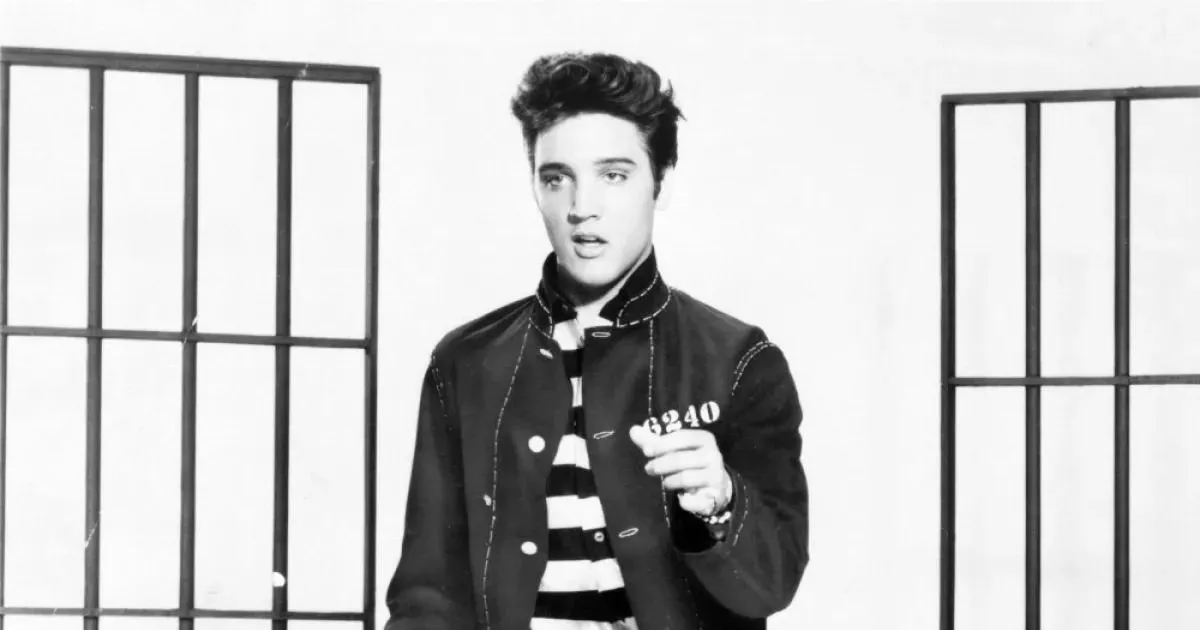Discover the career path of Elvis Presley, from the first major opportunity to industry-changing achievements.
Elvis Presley, the "King of Rock and Roll," was a monumental American singer and actor, heavily influencing 20th-century culture. His groundbreaking, sexually charged performances and blending of musical genres, crossing racial boundaries, sparked both controversy and immense popularity. He remains a central figure in the history of rock and roll and American popular culture, known for his distinctive voice, charismatic stage presence, and impact on music, fashion, and entertainment.
October 3, 1945: First Public Performance
On October 3, 1945, at the age of 10, Elvis Presley had his first public performance at the Mississippi–Alabama Fair and Dairy Show, singing "Old Shep". He recalled placing fifth in the singing contest.
1945: Talent Show Performance
In 1945, Elvis Presley sang "Old Shep" at a talent show. He later recorded the song for his second RCA Victor album.
1946: Arthur Crudup's 'That's All Right'
In 1946, Arthur Crudup originally recorded the song "That's All Right". This song became significant for Elvis Presley when he recorded his version and launched his career.
1950: Guitar Practice with Lee Denson
In 1950, Elvis Presley began practicing guitar under the tutelage of Lee Denson, a neighbor. They, along with Dorsey and Johnny Burnette and two other boys, formed a loose musical collective.
June 1953: Graduation and Musical Aspirations
By the time he graduated high school in June 1953, Elvis Presley had singled out music as his future. He spent much of his time learning songs, listening to gospel music, and absorbing the sounds of blues and rhythm and blues from local radio stations.
August 1953: First Recording at Memphis Recording Service
In August 1953, Elvis Presley checked into Memphis Recording Service, run by Sam Phillips, to record a two-sided acetate disc. He recorded "My Happiness" and "That's When Your Heartaches Begin".
1953: Original Hit of Hound Dog
In 1953, "Hound Dog", written by Jerry Leiber and Mike Stoller, became a hit for blues singer Big Mama Thornton.
1953: Humes' Annual "Minstrel" Show Performance
In 1953, during his senior year, Elvis Presley competed in Humes' Annual "Minstrel" Show, singing and playing "Till I Waltz Again with You" by Teresa Brewer. The performance significantly improved his reputation.
January 1954: Second Acetate Recording at Sun
In January 1954, Elvis Presley cut a second acetate at Sun, recording "I'll Never Stand in Your Way" and "It Wouldn't Be the Same Without You". Despite these efforts, nothing immediately came of the recordings.
July 17, 1954: First Public Performance
On July 17, 1954, the trio of Elvis Presley, Scotty Moore, and Bill Black played publicly for the first time at the Bon Air club. Later that month, they appeared at the Overton Park Shell, where Elvis pioneered his signature "Rubber legs" dance movement.
November 1954: Performance on Louisiana Hayride
In November 1954, Elvis Presley performed on Louisiana Hayride, a rival to the Grand Ole Opry. His first set was met with a muted reaction, but his second set inspired an enthusiastic response, leading to a year-long engagement on the show.
1954: Beginning of Elvis' Music Career
In 1954, Elvis Presley began his music career at Sun Records with producer Sam Phillips. This collaboration aimed to bring the sound of African-American music to a broader audience. Presley, alongside Scotty Moore and Bill Black, pioneered rockabilly music.
August 1955: Management Contract Renewal and Special Advisor Appointment
In August 1955, Elvis Presley renewed his management contract with Bob Neal while simultaneously appointing Colonel Tom Parker as his special advisor, marking a significant change in his management structure.
1955: Rise to Regional Star Status
By early 1955, Elvis Presley's regular appearances on Louisiana Hayride, constant touring, and well-received record releases had made him a regional star.
1955: D.J. Fontana Joins and RCA Victor Acquires Contract
In 1955, D. J. Fontana joined Elvis Presley's band as the drummer, completing the classic quartet. Also in 1955, RCA Victor acquired Elvis' contract in a deal arranged by Colonel Tom Parker, who became his manager.
January 10, 1956: First RCA Victor Recordings
On January 10, 1956, Elvis Presley made his first recordings for RCA Victor in Nashville, Tennessee, accompanied by his regular band, a pianist, guitarist Chet Atkins, and background singers. This session produced the song "Heartbreak Hotel".
January 1956: Release of "Heartbreak Hotel"
In January 1956, Elvis Presley's first RCA Victor single, "Heartbreak Hotel", was released. The song became a number-one hit in the US, and within a year, RCA Victor sold ten million Presley singles.
September 9, 1956: First Appearance on The Ed Sullivan Show
On September 9, 1956, Elvis Presley made his first appearance on The Ed Sullivan Show, which was seen by approximately 60 million viewers. He performed "Love Me Tender", leading to a million advance orders and solidifying his status as a national celebrity.
November 1956: Film Debut in Love Me Tender
In November 1956, Elvis Presley made his film debut in "Love Me Tender". This marked the beginning of his acting career in addition to his music career.
1956: Presley's Rise to National Attention
In 1956, Elvis Presley's rise to national attention transformed popular music and had a huge effect on popular culture. He was central to defining rock and roll as a musical genre and a touchstone of youth culture and rebellious attitude. Rock and roll's occupation of a central position in mainstream American culture facilitated a new acceptance and appreciation of black culture.
1956: Debut Album Tops British Charts
In 1956, Elvis Presley's self-titled debut album topped the British charts, marking the beginning of his record for the longest span between number-one albums by anyone.
January 6, 1957: Third and Final Ed Sullivan Show Appearance
On January 6, 1957, Elvis Presley made his third and final appearance on The Ed Sullivan Show, where he was shot only down to the waist. He performed "Peace in the Valley", and Sullivan declared him "a real decent, fine boy".
1957: Starring in Jailhouse Rock
In 1957, Elvis Presley starred in the film "Jailhouse Rock", which became one of his most famous movies. This further solidified his presence in the film industry.
January 1958: Recording King Creole Soundtrack
In mid-January 1958, Elvis Presley held recording sessions in Hollywood for the King Creole soundtrack. Leiber and Stoller provided three songs, marking the last time they worked closely together with Presley.
1958: Top-40 Hits During Military Service
During Elvis Presley's military service in 1958, he had several top-40 hits, including "Wear My Ring Around Your Neck", the bestselling "Hard Headed Woman", and "One Night". RCA also released the album "Elvis' Golden Records".
1959: More Top-40 Hits During Military Service
In 1959, while still in the army, Elvis Presley released the songs "(Now and Then There's) A Fool Such as I" and the number-one "A Big Hunk o' Love", which were successful.
1961: Starring in Blue Hawaii
In 1961, Elvis Presley starred in the film "Blue Hawaii", which was one of his most famous and commercially successful movies.
1964: Starring in Viva Las Vegas
In 1964, Elvis Presley starred in the film "Viva Las Vegas". This movie is among his most famous and marked another significant role in his acting career.
1969: Original Release of Rubberneckin'
In 1969, Elvis Presley originally recorded the song "Rubberneckin'". A remix of this song would become successful decades later.
January 1973: Presley Performs Benefit Concerts and Films Aloha from Hawaii
In January 1973, Elvis Presley performed two benefit concerts for the Kui Lee Cancer Fund in connection with the Aloha from Hawaii television special. The first show was a practice run for the live broadcast. The special was broadcast live via satellite on January 14 to audiences in Japan, South Korea, Thailand, the Philippines, Australia, and New Zealand, and to U.S. servicemen in Southeast Asia. The following night, it was simulcast to twenty-eight European countries, and in April, an extended version aired in the U.S. The accompanying double album went to number one and eventually sold over 5 million copies in the U.S.
December 1973: Productive Recording Session
In December 1973, Elvis Presley had a productive recording session, producing eighteen songs, enough for almost two albums.
1973: Aloha from Hawaii Concert
In 1973, Elvis Presley gave the first concert by a solo artist to be broadcast around the world, "Aloha from Hawaii". This event marked a significant milestone in his career and in music history.
1974: No Official Studio Recordings and Release of Concert Record
In 1974, Elvis Presley made no official studio recordings. Instead, Parker delivered RCA another concert record, Elvis Recorded Live on Stage in Memphis. This album included a version of "How Great Thou Art" that later won Elvis his third and final Grammy Award.
1974: Intensive Touring Schedule Despite Health Decline
In 1974, despite failing health, Elvis Presley undertook another intensive touring schedule. This occurred after a year in which he staged more live shows than ever before (168 concerts in 1973).
March 1975: Return to Recording Studio
In March 1975, Elvis Presley returned to the recording studio.
1976: Recording Sessions at Graceland
In 1976, RCA sent a mobile recording unit to Graceland, making possible two full-scale recording sessions, though the recording process had become a struggle for Elvis Presley.
June 6, 1977: Release of "Way Down"
On June 6, 1977, "Way Down", Elvis Presley's last single issued during his lifetime, was released.
June 26, 1977: Final Concert in Indianapolis
On June 26, 1977, Elvis Presley held his final concert in Indianapolis at Market Square Arena.
1977: President Carter Remarks on Presley's Legacy
In 1977, President Jimmy Carter remarked on Elvis Presley's legacy, noting that his music and personality, fusing white country and black rhythm and blues styles, permanently changed American popular culture. Presley also heralded the expanded reach of celebrity in the era of mass communication.
2002: Remix of "A Little Less Conversation" Success
In 2002, a Junkie XL remix of Elvis Presley's "A Little Less Conversation" (credited as "Elvis Vs JXL") was used in a Nike advertising campaign during the FIFA World Cup. It topped charts in over twenty countries and was included in a compilation, ELV1S, which was also an international success, returning Presley to the top of the Billboard chart.
2003: Remix of "Rubberneckin'" Tops U.S. Sales Chart
In 2003, a remix of "Rubberneckin'", originally recorded in 1969 by Elvis Presley, topped the U.S. sales chart.
2005: Reissued Singles Top UK Charts
In 2005, three reissued Elvis Presley singles, "Jailhouse Rock", "One Night"/"I Got Stung", and "It's Now or Never", went to number one in the UK. This was part of a campaign to re-release all eighteen of Presley's previous chart-topping UK singles.
2015: If I Can Dream Album Reached Number One in the UK
In 2015, the album "If I Can Dream", setting Presley's vocals against music by the Royal Philharmonic Orchestra, reached number one in the UK, adding to his record for number-one UK albums by a solo artist.
2016: The Wonder of You Album Reached Number One in the UK
In 2016, the album "The Wonder of You", setting Presley's vocals against music by the Royal Philharmonic Orchestra, reached number one in the UK, contributing to his record for number-one UK albums by a solo artist.
Mentioned in this timeline

The White House located at Pennsylvania Avenue NW in Washington...
California is a U S state on the Pacific Coast...

Lisa Marie Presley - was an American singer-songwriter and the...
New Zealand is an island country located in the southwestern...

Priscilla Presley is an American actress and businesswoman best known...
The National Broadcasting Company NBC is a major American commercial...
Trending

3 months ago Isla Fisher Reveals Woody Harrelson's Unusual Habit on Air, Leaving Al Roker in Hysterics

3 months ago Alcaraz Rallies to Victory Against Fritz, Closing in on No. 1 Ranking
Chris Bassitt is an American professional baseball pitcher currently playing for the Toronto Blue Jays in MLB He debuted in...

10 months ago Bobby Portis: From Turmoil to Triumph, Focused on Bucks Playoff Series

Jason Derulo is an American singer and songwriter who gained fame in He has sold over million singles globally with...

2 months ago Nina Dobrev enjoys Mexican getaway with friends after Shaun White split, finding beach vibes.
Popular

Kid Rock born Robert James Ritchie is an American musician...
The Winter Olympic Games a major international multi-sport event held...

XXXTentacion born Jahseh Dwayne Ricardo Onfroy was a controversial yet...

Barack Obama the th U S President - was the...

Michael Joseph Jackson the King of Pop was a highly...

KFC or Kentucky Fried Chicken is an American fast-food chain...
